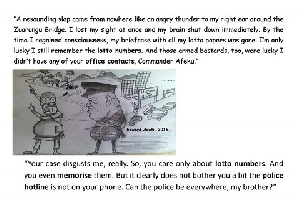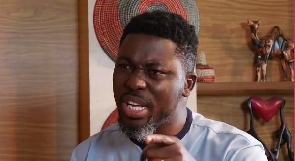- Home - News
- TWI News | TV
- Polls
- Year In Review
- News Archive
- Crime & Punishment
- Politics
- Regional
- Editorial
- Health
- Ghanaians Abroad
- Tabloid
- Africa
- Religion
- Election 2020
- Coronavirus
- News Videos | TV
- Photo Archives
- News Headlines
- Press Release
Opinions of Tuesday, 29 March 2016
Columnist: Starrfmonline.com
Police, public in blame game over hotline
Upper East is a funny place. The police gunned down a notorious gang leader at his hideout. As expected, the public jumped in disorderly celebration but with caution. Then, surprisingly, sour tales soon overtook that celebration that the bereaved members of the armed gang had reclaimed the body of the leader and had humourlessly announced their intention to snatch thirty posh motorcycles at any cost and sell them to raise funds to perform the funeral of their slain mentor.
In a separate development, a manager of a radio station in the region was robbed of his motorcycle by another gang. Soon after the incident was mentioned on air the following day, someone called the victim anonymously, directing him as to how to repossess his bike at a fee. He was furnished with a contact to a gang leader. The gang leader, just trying to be sure if the item was among the stolen goods in his warehouse or not, asked the victim a number of questions on the phone.
Gang leader: Where did they stop you?
Victim: Around the junction to the Catering Rest House.
Gang leader: Around what time?
Victim: 9:30pm.
Gang leader: What weapons were they carrying?
Victim: Cutlasses.
Gang leader: No, they’re not my boys. My boys use guns.
And these are just two examples of how criminal gangs in a region of law and order, to the raw shock of the public, can afford the luxury of relaxed space to sound as if they are a republic whose undercover operations have been approved by a constitutional parliament.
Nonetheless, they have been instances, even the last one as recently as February, this year, when the police have exchanged deadly fire with such gangs and have won the battle to remind both the terror groups and the terrified public of who is really and constitutionally in charge of the region.
But in all of this, police in the region say public disinterest in anticrime hotlines is seriously fanning the flames of crime in the region. In other words, individuals who do not see the need to keep anticrime contacts in their phonebooks are to blame when criminals strike and get away with it. The public, in short, may be doing too little to fight crime. That is what the police claim.
We’ve done publicity ? Police
Too many criminals, according to the Upper East Regional Commander, DCOP Simon Yaw Afeku, have continued to strike unrestrained from the blind side of the police largely because a substantial majority of residents, who should be supporting to avert such criminal operations by alerting the police, are still not familiar with the hotlines despite the publicity given to the contacts.
“Sometimes, it’s very appalling. We continue putting out our hotlines. It’s reachable day and night throughout the seven days of the week. But the majority of people are yet to live up to this. We have been putting it out every time so that when you notice something going wrong, you call the information room and the information room would appropriately direct the call to which zonal patrols or which quick response team is supposed to react to those situations.
“It could have added to the reduction of crime where the criminal knows that the police would be able to get to the scene quickly. By and large, most people don’t take interest in the police until there is a problem,” the regional commander remarked.
Hotline is not Visible? Public
I asked a good number of people in Bolgatanga, the regional capital, why they hardly patronised the hotline.
Whilst about 22% of the respondents interviewed admitted they had been uncaring about the hotline simply because they had never felt through an experience what violent crime really was, about 46% said they did not see the need to have it because they doubted the police would respond swiftly when notified and about 32% said they did not have the hotline because it had not been visible or publicised enough.
“For me, why I don’t have that number is just that I have never experienced anything like that. So, we take things for granted, we feel reluctant to have those contacts because most of us have not fallen victims before. Those who even have the contacts call but sometimes there is no immediate response. We’ve seen cases like that where people call, there is no response. By the time they come, the armed robbers have robbed and run away, leaving you alone. So, you feel there is no confidence in the police; so, you wouldn’t want to waste your time,” Hegelar Badumah said.
Another resident, Jonathan Adanigna, complained: “If it (hotline) is displayed everywhere in the major vantage places in towns and communities for us to see, many of would have it. It’s a public number. But right now, I don’t even know where and how to get it.”
Stealing tops crime chart
Stealing, mostly of motorcycles, has always occupied the topmost slot of the crime chart from the dawn of time in the region. And lynching of motorbike snatchers, surprisingly, is increasingly appearing as a close rival to stealing, competing for the peak of the crime chart.
Lynching of crime suspects is rampant in the region mainly because the public is of the view that the justice system is not hard enough on suspects captured and handed over to the police. That position is firmly rooted in an African proverb that cautions people when they kill a snake to just cut off its head. People want to eliminate suspects once and for all not just to appease themselves for some untold harm they might have suffered at the hands criminals in the past but also to ensure that the suspects they have beaten and shamed in public do not regain freedom from police or prison custody to take revenge on anybody.
The waiting urge in the hearts of the public to unleash terror on any robbery suspect can only be matched by the fury of an impatient molten magma desperately searching for an outlet to erupt. I witnessed one where police officers, in their attempt to rescue a suspect from an angry mob, were pelted with rocks and metals. The police lost the struggle and only left the scene heading for the morgue with the rescued body of the suspect.
Whilst the regional police command is lashing out at the public for harbouring criminals and commending a few who are divulging useful tipoffs, the public, too, is accusing the police of dining with robbery gangs and commending some police officers who are serving with integrity in the region.
The thieves are our boys?Regional Minister
The Regional Minister himself, Albert Abongo, is disturbed about the prevalent habit of harbouring criminals despite ceaseless appeals to the public to expose them to the security agencies.
“All those who are stealing motorbikes, clubbing people whilst they are on their motorbikes and seizing them, are our own boys. We know them, we are watching them and we are keeping quiet. Everywhere is a road. So, how many policemen are we going to deploy? So, we have to get tough! We have to attack them! They are in our own homes. We have to find a way to get those people arrested so that there will be calm,” the Regional Minister recently told a coalition of civil society organisations.
Making the hotline as visible as possible and keeping it as close as possible surely will keep criminals as far away as possible particularly in this Easter celebration period and as the November election draws closer. And who knows?the criminals or suspects themselves might need the same hotline to avert any lynching or mob justice dangling over their heads. The hotline is 0382022401.











